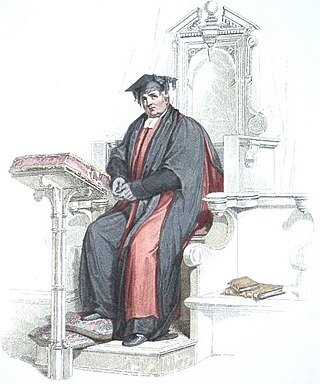
Doctor is an academic title that originates from the Latin word of the same spelling and meaning. The word is originally an agentive noun of the Latin verb docēre 'to teach'. It has been used as an academic title in Europe since the 13th century, when the first doctorates were awarded at the University of Bologna and the University of Paris.

Sir Harrison Birtwistle was an English composer of contemporary classical music best known for his operas, often based on mythological subjects. Among his many compositions, his better known works include The Triumph of Time (1972) and the operas The Mask of Orpheus (1986), Gawain (1991), and The Minotaur (2008). The last of these was ranked by music critics at The Guardian in 2019 as the third-best piece of the 21st century. Even his compositions that were not written for the stage often showed a theatrical approach. A performance of his saxophone concerto Panic during the BBC's Last Night of the Proms caused "national notoriety". He received many international awards and honorary degrees.

The Royal College of Music (RCM) is a conservatoire established by royal charter in 1882, located in South Kensington, London, UK. It offers training from the undergraduate to the doctoral level in all aspects of Western Music including performance, composition, conducting, music theory and history, and has trained some of the most important figures in international music life. The RCM also conducts research in performance practice and performance science.

A doctorate or doctoral degree is a postgraduate academic degree awarded by universities and some other educational institutions, derived from the ancient formalism licentia docendi.

A composer is a person who writes music. The term is especially used to indicate composers of Western classical music, or those who are composers by occupation. Many composers are, or were, also skilled performers of music.
The Royal Academy of Music (RAM) in London, England, is one of the oldest music schools in the UK, founded in 1822 by John Fane and Nicolas-Charles Bochsa. It received its royal charter in 1830 from King George IV with the support of the first Duke of Wellington.
Degree abbreviations are used as an alternative way to specify an academic degree instead of spelling out the title in full, such as in reference books such as Who's Who and on business cards. Many degree titles have more than one possible abbreviation, with the abbreviation used varying between different universities. In the UK it is normal not to punctuate abbreviations for degrees with full stops, although this is done at some universities.

The Doctor of Arts is a discipline-based terminal doctoral degree that was originally conceived and designed to be an alternative to the traditional research-based Doctor of Philosophy (Ph.D.) and the education-based Doctor of Education (Ed.D.). Like other doctorates, the D.A. is an academic degree of the highest level. The D.A. is also frequently conferred as an honorary degree with the added designation of honoris causa.

The doctor of musical arts (DMA) is a doctoral academic degree in music. The DMA combines advanced studies in an applied area of specialization with graduate-level academic study in subjects such as music history, music theory, or music education. The DMA degree usually takes about three to four years of full-time study to complete, preparing students to be professional performers, conductors, and composers. As a terminal degree, the DMA qualifies its recipient to work in university, college, and conservatory teaching/research positions. Students seeking doctoral training in musicology, teaching, leadership, music administration or music theory typically enter a doctor of music education (DME) or PhD program, rather than a DMA program.
A Doctor of Science is a science doctorate awarded in a number of countries throughout the world. In some countries, a Doctor of Science is the degree used for the standard doctorate in the sciences; elsewhere a Doctor of Science is a "higher doctorate" awarded in recognition of a substantial and sustained contribution to scientific knowledge beyond that required for a Doctor of Philosophy (PhD).

A Doctor of Divinity is the holder of an advanced academic degree in divinity.

The Royal Northern College of Music (RNCM) is a conservatoire located in Manchester, England. It is one of four conservatoires associated with the Associated Board of the Royal Schools of Music. In addition to being a centre of music education, RNCM is one of the UK's busiest and most diverse public performance venues.
Sir John Rowland Tomlinson is an English opera singer, specifically a bass.
A terminal degree is the highest-level university degree that can be achieved and awarded in an academic discipline or professional field. In other cases, it is a degree that is awarded because a doctoral-level degree is not available nor appropriate. The two main types of terminal degrees are academic or professional.
Doctor of Letters also termed "Doctor of Literature" in some countries is a terminal degree in the arts, humanities and social sciences that, depending on the country, is a higher doctorate after the Doctor of Philosophy (Ph.D.) degree or equivalent to a higher doctorate, such as the Doctor of Science or Doctor of Laws (LL.D). It is awarded in many countries by universities in recognition of superior accomplishment in the Arts, Social Sciences or humanities, such as original contributions to the creative or cultural arts, or scholarship in Social Sciences and humanities and other merits. It may be conferred as an earned degree upon the completion of a regular doctoral course of study, usually including the development and defense of an original dissertation, or may be conferred as an earned higher doctorate after the submission and academic evaluation of a portfolio of sustained scholarship, publications, research, or other scientific work of the highest caliber.
Doctor of Fine Arts (DFA) is a professional doctoral degree in fine arts. It may also be awarded as an honorary degree.
A Doctor of Philosophy is a terminal degree that usually denotes the highest level of academic achievement in a given discipline and is awarded following a course of graduate study and original research. The name of the degree is most often abbreviated PhD, pronounced as three separate letters.
E-Theses Online Service (EThOS) is a bibliographic database and union catalogue of electronic theses provided by the British Library, the National Library of the United Kingdom. As of February 2022 EThOS provides access to over 500,000 doctoral theses awarded by over 140 UK higher education institutions, with around 3,000 new thesis records added every month.

The Department of Music is the music school of the University of Durham.










